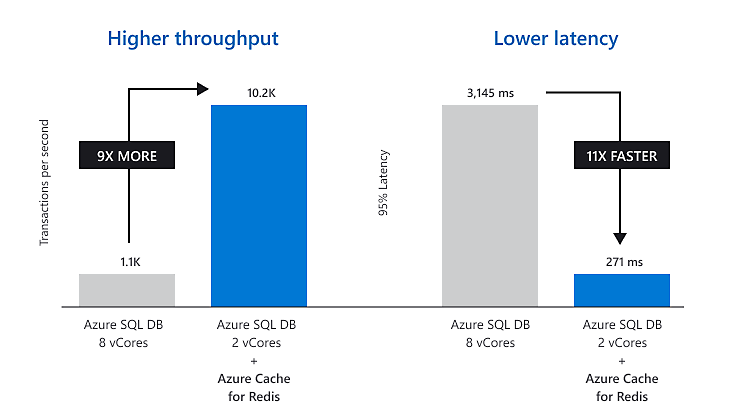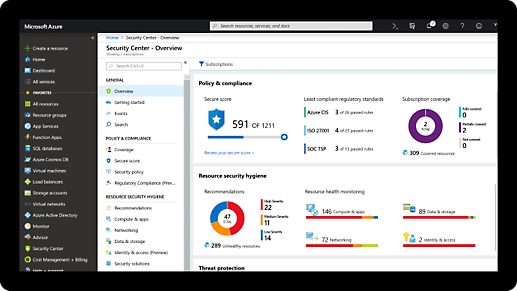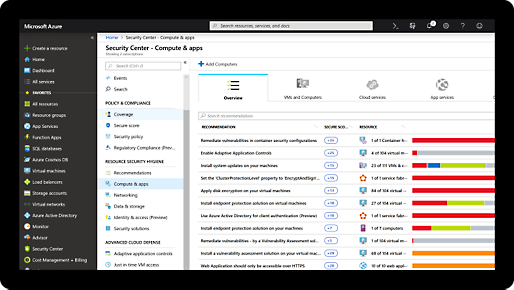
Your app. Faster.
As traffic and demands on your app increase, scale performance simply and cost-effectively. Add a quick caching layer to the application architecture to handle thousands of simultaneous users with near-instant speed—all with the benefits of a fully managed service.
Superior throughput and performance to handle millions of requests per second with down to sub-millisecond latency
Fully managed service with automatic patching, updates, scaling, and provisioning so you can focus on development
RedisBloom, RediSearch, RedisJSON, and RedisTimeSeries module integration, supporting data analysis, search, and streaming
Powerful capabilities including clustering, active geo-replication, Redis on Flash, and availability of up to 99.999 percent
What you can build using Azure Cache for Redis
Improve application throughput and latency
Use Azure Cache for Redis to accelerate your data layer through caching. Adding Azure Cache for Redis can increase data throughput by over 800 percent while increasing latency performance by over 1,000 percent1 at a cost-effective price. It’s a great way to efficiently scale applications and improve user experience without the expense of rearchitecting your underlying database.


Speed up applications with a distributed cache
Complement database services like Azure SQL Database and Azure Cosmos DB by enabling your data tier to scale throughput at a lower cost than through expanded database instances. Store and share database query results, session states, and static content by using a common cache-aside pattern, and make your application more nimble and scalable.
Efficiently store session data
Quickly save, retrieve, and update web session data, such as user cookies and output pages. Improve the performance of your application by increasing its responsiveness and enabling it to handle increasing loads with fewer web-compute resources. Take advantage of data persistence, and automatic data duplication for maximum user data reliability. Scale out to terabyte size using clustering to meet the needs of even the largest enterprises and synchronize session data globally with active geo-distribution.


Communicate between services as a message broker
Use Azure Cache for Redis as a solution for implementing publish/subscribe or queue architectures. Route real-time messages and scale up web communication frameworks such as SignalR. Use industry-standard TLS encryption for data in transit, and configure proper network isolation with Azure Private Link.

Upgrade app performance with Redis Enterprise on Azure
Get game-changing support for popular Redis Enterprise features via Enterprise and Enterprise Flash tiers of Azure Cache for Redis, developed in partnership with Redis Inc. Take advantage of active geo-replication to create globally distributed caches with up to 99.999% availability. Add new data structures that enhance analytics and machine learning with the included RediSearch, RedisBloom, and RedisTimeSeries modules. And gain massive cache sizes at a lower price point by using the Enterprise Flash tier to run Redis on speedy flash storage.

Enjoy Redis as a fully managed service
Deploy faster by using a fully managed service on Azure. Azure Cache for Redis is backed by open-source Redis and natively supports Redis data structures including hashes, lists, and sorted sets. If your application uses Redis, it will work with Azure Cache for Redis. Streamline migration by importing and exporting Azure Cache for Redis database files.
Comprehensive security and compliance, built in
-
Microsoft invests more than USD1 billion annually on cybersecurity research and development.



-
We employ more than 3,500 security experts who are dedicated to data security and privacy.

-
Azure has more certifications than any other cloud provider. View the comprehensive list.
-
Cost-effective pricing that gives you control
With five pricing tiers and reserved pricing options, you have the flexibility to tailor performance to your workload. See pricing details.
Get started with an Azure free account
1

2

After your credit, move to pay as you go to keep building with the same free services. Pay only if you use more than your free monthly amounts.
3

Trusted by companies of all sizes
Alaska Airlines makes shopping easier
"We wanted to use Azure Cache for Redis and getting that running on-premises wasn't easy. But in Azure, with three clicks, we had it. We didn't have to coordinate with other teams to set up new infrastructure and figure out how to maintain it once we hit production, and that's a beautiful thing."
Ralph Feltis, Senior Software Engineer, Alaska Airlines

CarMax drives online innovation
"Azure PaaS (platform as a service) gave us access to a complete set of capabilities such as Azure Cache for Redis that we didn't have to build ourselves. We can spin up these services and start using them in less than an hour, which is incredible."
Brandon Linton, Solution Architect, CarMax

Pet care leader creates global distributed solution
Mars used Azure Cache for Redis as a message broker, providing fast access to data across application sessions and services.

Chipotle builds scalable new website
Chipotle used Azure Cache for Redis to improve website performance and handle its rapidly growing customer base.

SitePro streamlines real-time IoT data ingestion
"We can do more with Redis by leveraging the RedisTimeSeries module to support data collection and analytics from hundreds of thousands of IoT sensors."
Dustin Brown, Director of Technology, SitePro

Azure Cache for Redis resources and documentation
Learning resources
Quickstarts:
.NET | .NET Core | ASP.NET | Java
Tutorial:
Microsoft Learn:
Cache read-only data with Redis
Improve session scalability in a ASP.NET web application
Accelerate and scale a Spring Boot application with Azure Cache for Redis
Popular developer resources
SDKs:
.NET | Java | REST API | Redis client | Redis commands
Solution architectures:
Caching best practices | Cache-aside
Highly available app services deployment
E-commerce front end | E-commerce output caching
Frequently asked questions about Azure Cache for Redis
-
Azure Cache for Redis is a fully managed, in-memory cache that enables high-performance and scalable architectures. Use it to create cloud or hybrid deployments that handle millions of requests per second at sub-millisecond latency—all with the configuration, security, and availability benefits of a managed service.
-
While most databases store data on slower, disk-based storage, Azure Cache for Redis stores data in memory. Since memory is significantly faster than disk storage, data can be written and retrieved much faster.
-
In some cases—and often in session store use cases—Azure Cache for Redis can be used as a standalone database. However, most of the time, it is best used as a complement to a database in the form of a cache. Azure Cache handles data that needs to be accessed more frequently, while the database handles data that needs to be stored for the longer term.
-
Azure Cache for Redis offers exceptional reliability with a 99.9 percent SLA. Most tiers provide a built-in replica that acts as a failover if the primary instance goes down. You can also configure your Azure Cache for Redis instance to use data persistence to recover data in the event of a hardware failure.
Ready when you are—let’s set up your Azure free account
- [1] Performance claims are based on data from a study commissioned by Microsoft and conducted by GigaOm in October 2020. The study compared the performance of a test application using an Azure database with and without implementing Azure Cache for Redis as a caching solution. Azure SQL Database and Azure Database for PostgreSQL were used as the database element in the study. A 2 vCore Gen 5 General Purpose instance of Azure SQL Database and a 2 vCore General Purpose instance of Azure Database for PostgreSQL were used with a 6 GB P1 Premium instance of Azure for Redis. These results were compared with 8, 16, 24, and 32 vCore Gen 5 General Purpose instances of Azure SQL DB and 8, 16, 24, and 32 vCore General Purpose instances of Azure Database for PostgreSQL without Azure Cache for Redis. The benchmark data is taken from the GigaOm Web Application Database Load Test which simulates a common web application and backend database barraged by increasing HTTP requests. Actual results may vary based on configuration and region.
- [2] Redis is a registered trademark of Redis Ltd. Any rights therein are reserved to Redis Ltd. Any use by Microsoft is for referential purposes only and does not indicate any sponsorship, endorsement or affiliation between Redis and Microsoft.







